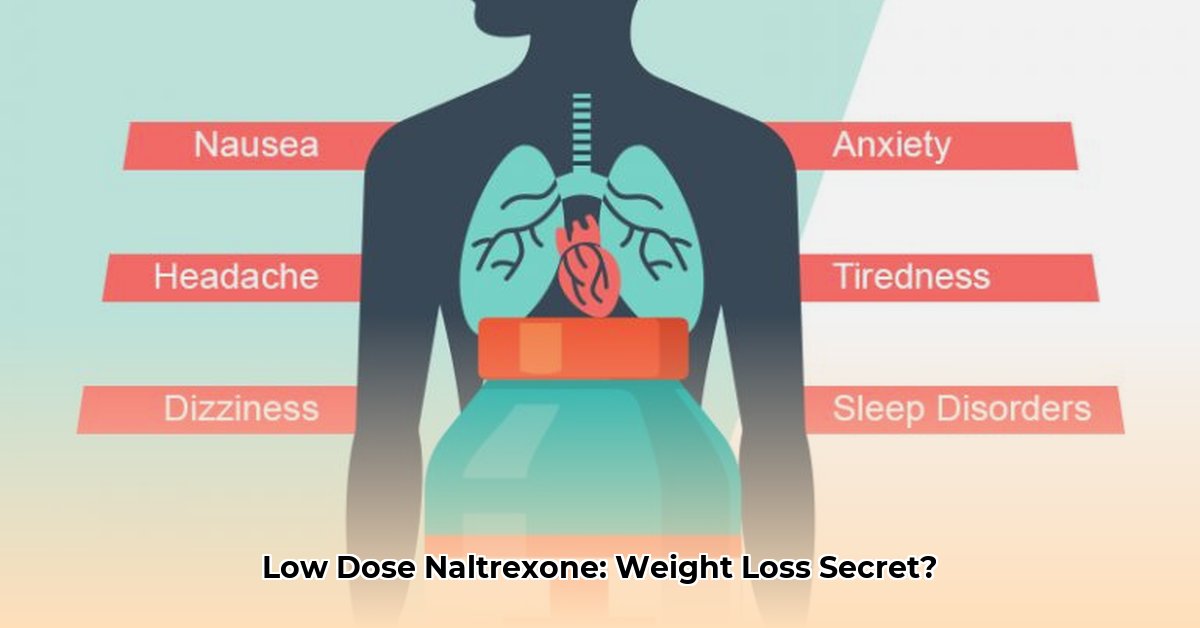
Losing weight can be challenging, and individuals constantly seek new approaches. Low-dose naltrexone (LDN) (a significantly lower dose than that used to treat opioid addiction), has emerged as a potential aid, but does it deliver on its promises? This review examines the current evidence, exploring potential mechanisms, analyzing existing research (and its limitations), and comparing LDN to established weight-loss methods.
Understanding Low-Dose Naltrexone and Weight Loss
Many are curious about LDN's potential for weight loss. While the Food and Drug Administration (FDA) hasn't approved it for this purpose, accumulating research warrants investigation. Several proposed mechanisms suggest its potential impact on weight management.
LDN and Appetite Regulation
Some studies suggest LDN may influence appetite by subtly modifying opioid receptors in the brain. This could lead to reduced food cravings and improved portion control, encouraging healthier eating habits. However, the evidence is not definitive. Studies are frequently small, exhibit conflicting results, and employ varying LDN dosages, thus necessitating larger, more standardized trials.
Metabolic Effects of LDN: Insulin Sensitivity
Preliminary research hints at LDN's potential to enhance insulin sensitivity. Improved insulin sensitivity means the body processes sugar more efficiently, preventing blood sugar spikes and crashes that often contribute to weight gain. This is particularly relevant for individuals with insulin resistance. However, again, robust, large-scale clinical trials are needed before any firm conclusions can be drawn.
The Impact of LDN on Sleep and Stress
Adequate sleep significantly impacts overall health and weight management. Some studies suggest LDN may improve sleep quality, potentially contributing to weight loss indirectly. Better sleep can lead to better hormone regulation impacting appetite and metabolism, plus reduced stress, which itself can positively influence metabolic function. The direct link between LDN-improved sleep and weight loss, however, requires further investigation.
The Challenges and Limitations of Current Research
While anecdotal evidence exists, the lack of extensive, well-designed clinical trials using standard LDN doses for weight loss remains a major obstacle. Existing studies often yield conflicting results, hindering a clear understanding of LDN's impact on weight. Therefore, firm conclusions remain elusive.
LDN versus FDA-Approved Weight Loss Medications: Contrave
It's crucial to understand that LDN is not FDA-approved for weight loss. In contrast, naltrexone/bupropion (Contrave) is a clinically proven weight loss medication. Let's compare these two:
Contrave: A Clinically Proven Option
Contrave, a combination of naltrexone (at a much higher dose than in LDN) and bupropion, has demonstrated consistent weight loss in large-scale clinical trials involving individuals with a BMI of 30 or higher (or 27 with related health conditions). This success is typically observed when combined with lifestyle modifications, including diet and exercise.
A Direct Comparison: LDN vs. Contrave
The fundamental difference lies in the strength of scientific evidence. While small studies suggest LDN's potential, larger, more rigorous trials are essential to confirm its efficacy. Contrave, on the other hand, has abundant research and FDA approval supporting its use for weight management. This does not negate LDN's potential, only highlights the need for more comprehensive research.
Side Effects and Safety Considerations
Both LDN and Contrave carry potential side effects. Contrave is more extensively studied regarding side effects, with gastrointestinal issues reported commonly. LDN's side effect profile is less characterized due to the limited research. Consulting a healthcare professional is vital before starting either treatment.
Key Takeaways and Conclusion
While some studies suggest potential benefits of LDN regarding appetite control, insulin sensitivity, and sleep quality, more robust research is imperative to establish its efficacy for weight loss. Currently, Contrave offers a more reliable and scientifically supported pathway to weight management. A holistic approach incorporating a healthy diet and regular exercise remains pivotal. Consult your doctor before considering LDN or other weight loss medications. Remember, ongoing research may refine our understanding in the future.
Key Takeaways:
- Current evidence for LDN's weight-loss benefits is inconclusive, requiring larger clinical trials.
- Contrave has stronger scientific support and FDA approval for weight loss.
- Both treatments have potential side effects, necessitating medical guidance.
- Lifestyle changes (diet and exercise) are crucial for sustainable weight loss.